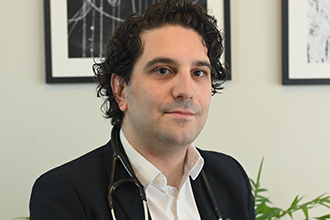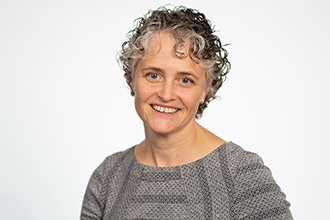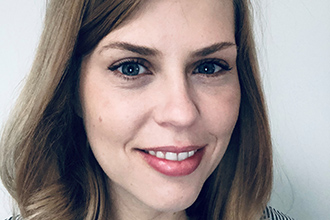Pilot program in the emergency department helps patients experiencing homelessness and substance use during COVID-19

By Jennifer Stranges

Dr. Alexander Caudarella
Many people are turning to substances to cope with the isolation and uncertainty of the COVID-19 pandemic, putting additional strain on emergency services, says Dr. Alexander Caudarella, an addictions physician at St. Michael’s Hospital. In fact, data show more Torontonians died of suspected overdoses last month than any other month since Sept. 2017.
But a pilot project in the St. Michael’s emergency department (ED) is assigning extra clinical support in the ED to ensure patients experiencing homelessness with complex health issues, including substance use, continue to receive a dignified and robust quality of care during the COVID-19 pandemic, while taking pressure off of the ED.
“At a time of increased social isolation, decreased services and a tragic spike in overdoses,
we have received really positive feedback from patients and community providers,” said Dr. Caudarella, who is also
one of the leads of the pilot program, along with fellow Unity Health Toronto physicians Dr. Michelle Klaiman, Dr. Evelyn Dell
and Dr. Kit Fairgrieve.
The Pandemic Inner City Health Emergency Department (PICH-ED) program is a collaboration between St. Michael’s ED, the department of mental health, the family medicine team and a group of concerned community clinic physicians from the neighborhood. The project has pulled in extra physicians, family physician residents, social workers and nursing staff to emergency department shifts, so that high-risk patients with substance use issues are given comprehensive medical attention.

Dr. Carolyn Snider
“We know that people who use drugs and alcohol are at a high risk of leaving hospital before finishing their medical treatment,” says Dr. Caudarella. “In addition to dangerous outcomes for individuals, this represents a significant public health risk during COVID. The PICH-ED team is there to help ensure everyone can access treatment and feels comfortable staying in hospital to get the care they need.”
“We have also been implementing a rapid response following overdoses to help start life-saving addiction treatment and reduce risk of future fatal overdose.”
Dr. Carolyn Snider, chief of St. Michael’s emergency department, said the PICH-ED team has been essential in providing support to both her team and this vulnerable patient population.
“This interdisciplinary group of emergency physicians, addictions physicians, social workers, ED and mental health nurses and community services workers are dedicated to provide care to the many patients who are experiencing homelessness in this challenging time.”
In addition to alleviating pressure from the hospital’s emergency department, the PICH-ED has provided a training opportunity to family medicine residents. Many family medicine residents pivoted their service to the emergency department when the pandemic began.

Dr. MaryBeth DeRocher
“The pandemic inevitably disrupted the scheduled learning experiences planned for the family medicine residents in our training program,” said Dr. MaryBeth DeRocher, a family physician and postgraduate director of family medicine at St. Michael’s. “We were thrilled to collaborate with the ED and mental health and addictions departments to have our family medicine residents provide care to the most vulnerable during these exceptionally chaotic times.”
Dr. DeRocher explained that residents have oscillated between delivering direct care to patients with acute substance use issues in the ED, to addressing the more chronic health needs or preventative health measures. It’s been an opportunity for resident doctors to understand the impact COVID-19 is having on an already marginalized population and the unique skills required to support them.
“Residents have described it as opportunity to actually do something when it felt like in-person clinical care was slipping away. Many have described their experience in the ED as invigorating and deeply meaningful.”
About St. Michael’s Hospital
St. Michael’s Hospital provides compassionate care to all who enter its doors. The hospital also provides outstanding medical education to future health care professionals in more than 27 academic disciplines. Critical care and trauma, heart disease, neurosurgery, diabetes, cancer care, care of the homeless and global health are among the Hospital’s recognized areas of expertise. Through the Keenan Research Centre and the Li Ka Shing International Healthcare Education Centre, which make up the Li Ka Shing Knowledge Institute, research and education at St. Michael’s Hospital are recognized and make an impact around the world. Founded in 1892, the hospital is fully affiliated with the University of Toronto.
About Unity Health Toronto
Unity Health Toronto, comprised of Providence Healthcare, St. Joseph’s Health Centre and St. Michael’s Hospital, works to advance the health of everyone in our urban communities and beyond. Our health network serves patients, residents and clients across the full spectrum of care, spanning primary care, secondary community care, tertiary and quaternary care services to post-acute through rehabilitation, palliative care and long-term care, while investing in world-class research and education. For more information, visit www.unityhealth.to.
